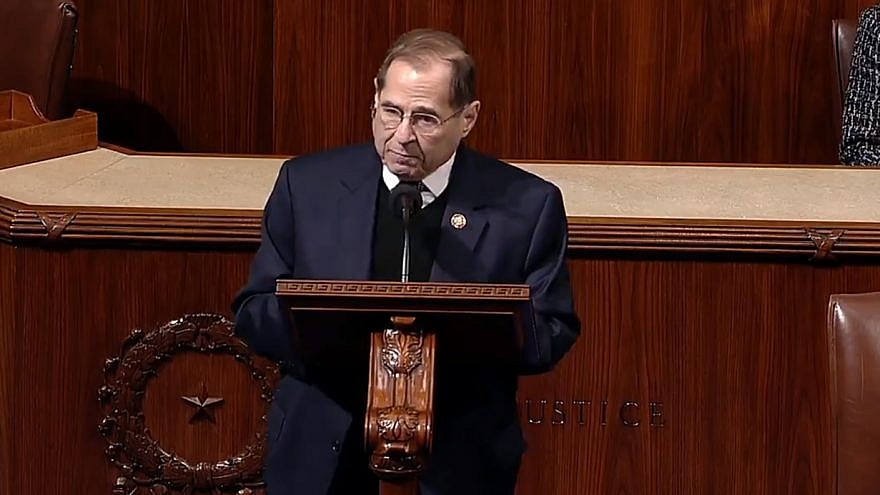Whether you support or oppose the effort to impeach and remove President Donald Trump from office, there’s little doubt that this historic battle is now dominating the American political landscape in a way so as to sideline every other issue or to turn them into impeachment sidebars. Unbelievably, that has also become true when it comes to concern over the rising tide of anti-Semitism that is sweeping across the globe.
Perhaps it was inevitable that conspiracy theorists would start spinning impeachment as a Jewish plot. But it was nonetheless jarring when a heretofore obscure website called Tru News began to air rants from a preacher who labeled impeachment a “Jew plot” to take down Trump. An extremist site called The Unz Review also published equally sinister claims about the role of Jews in impeachment.
This is familiar territory for those who have studied The Protocols of the Elders of Zion forgery that has been used by Jew-haters of every variety to justify conspiracy theories for more than a century. And it’s also catnip for those who, for partisan reasons of their own, have concocted a narrative in which any act of anti-Semitism can be blamed on Trump.
Like all conspiracy theories, there is a kernel of truth in that there are a great many Jewish individuals playing key roles in the impeachment drama. But neither Reps. Adam Schiff (D-Calif.) or Jerold Nadler (D-N.Y.)—the chairs of key House committees behind the Democratic push—nor supporters of Trump’s position, like Harvard Law professor emeritus Alan Dershowitz, did so as Jews or in defense of Jewish interests.
And nothing Trump does to condemn and even prosecute acts of anti-Semitism or in his unprecedented level of support for the State of Israel will ever convince his partisan foes that he can’t be held somehow responsible for crackpots who actually virulently oppose his stands on Jewish issues. Which is why any time spent obsessing about whether impeachment will feed anti-Jewish conspiracy theorists is pointless. Those who highlight the roles of Jewish individuals to make impeachment a “Jewish story” are following the lead of extremists and creating far more heat than they are shedding light on events.
But if we are looking for a specific reason to lament the impact of impeachment, it’s not because crackpots will use it to scapegoat Jews. Rather, it is the way it reflects the way the spirit of hyperpartisanship has worked its way into everything that happens in the American political process. That means that efforts to forge bipartisan consensus on issues that are of paramount importance to Jews—like the fight against anti-Semitism and the defense of Israel—are being undermined.
Lip service is still being paid to the notion that both the fight against anti-Semitism and support for Israel are issues on which there is a bipartisan consensus. And to a large extent that is still true. America is not Britain. Jew-hatred is confined to the margins of the political arena rather than having seized the leadership of one of the country’s major parties. Even in a Democratic Party that is divided about Israel, the overwhelming majority of its representatives in Congress are still strong supporters with only the members of “the Squad,” like Representatives Ilhan Omar (D-Minn.) and Rashida Tlaib (D-Mich.), being open supporters of the anti-Semitic BDS movement.
The president has opened himself up to criticism by coarsening the tone of our discourse and by making statements that some have, whether reasonably or unreasonably, tried to call dog whistles to extremists. Yet the demonization of Trump has helped make anti-Semitism into a partisan issue. When even a supposedly reasonable person like former Vice President Joe Biden blames Trump for white-supremacist violence against Jews while ignoring violence against Jews from sources that cannot conceivably be linked to Trump, such as attacks on Chassidic Jews in Brooklyn, N.Y., or the Jersey City shooting, then the issue becomes a partisan talking point.
The president’s commendable decision to follow legal opinions of past administrations and extend Title VI protections of the 1964 Civil Rights Act ought to have been applauded by both parties. But the same people who believe impeachment is necessary—no matter the excuse—because they think that Trump should never have been allowed to become president were willing to damn it with implausible arguments about it restricting free speech or even more improbably as proof of his sympathy for white-supremacist views about Jews.
The same is starting to also apply to discussions about Israel with avowedly pro-Israel Democrats opposing decisions they would have applauded had someone from their own party made them.
What’s even more troubling is that those who think this kind of partisan wrangling will end the day Trump exits the White House whether in January 2021 or January 2025 are almost certainly wrong.
The tone of the impeachment debate is more evidence that politics has replaced the role that religion used to play in the lives of most Americans. The divide over Trump and the parties is now one that sweet reason and appeals to the better angels of our nation cannot bridge, and it is likely that the results of the next election—no matter who wins—will only make things worse.
The price of impeachment for the Jews is not wacky conspiracy theories, but a collapse of centrist consensus that can no longer be counted on. It was hyperpartisanship that made this fight inevitable, and it will do the same for equally bitter conflicts in the future.
























